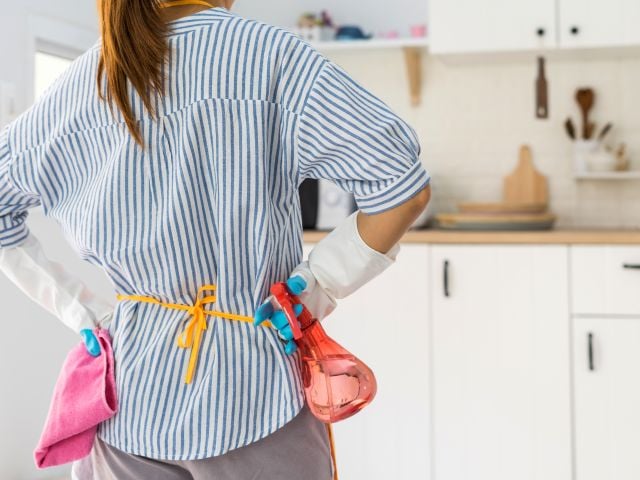Create a healthy space
Seal or remove arsenic-treated wood decks & play structures. Those built before 2003 likely contain arsenic. Don't allow children to eat at older picnic tables (or cover them with a cloth). Have kids wash hands after playing near these surfaces, or avoid them altogether.
Watch for lead paint. Older paint may contain lead. Kids face health risks from loose chips and lead in dust. If your building was built before 1978, use a certified lead-safe contractor for any repairs (epa.gov/lead).
Don't use bug spray or weed killer inside or out. Clean greener & disinfect when kids aren't around. Choose certified green cleaning supplies, dust & vacuum often (with a HEPA filter), use fragrance-free laundry detergent and skip air fresheners & dryer sheets.
Disinfectants can be toxic. Where necessary, disinfect with safer peroxide-based products or bleach. Always follow product directions.
Remove or repair furniture and mattresses with exposed foam. Before 2005, most foam was treated with toxic fire retardants.
Take care with compact fluorescent light bulbs. Don't put them in lamps that can fall, releasing mercury. If a bulb breaks, clear the room, air it out, put on gloves, safety glasses & a dust mask, seal the waste, wash up. Replace mercury thermometers & thermostats with mercury-free options.
Most important for infants:
- Mix formula with fluoride-free water, as the American Dental Association recommends. If your tap water has fluoride, buy non-fluoridated water.
- Don't serve ready-to-eat formula - it contains more BPA (from the can lining).
- Never microwave food or heat milk in plastic. Use glass or ceramic instead.
- Use glass or BPA-free baby bottles. Discard older plastic ones, especially if scratched.
- Use fragrance-free wipes, diapers & diaper cream.
Eating & drinking
Offer healthy snacks. Choose fruits & veggies from EWG's Clean 15 list (FoodNews.org) or buy organic – and always wash them. Don't microwave food in plastic. Microwave popcorn bags contain toxic chemicals – try air-popping instead. Choose organic dairy and meat when possible; buy rBGH/hormone-free milk. Use BPA-free dishware.
Wash little hands before eating - with plain soap & water. Skip anti-bacterial soaps – they're no better than plain soap and contain toxic triclosan. If you use alcohol based hand sanitizers, choose fragrance-free.
Drink safer water. Filter tap water as needed to remove contaminants. Check EWG's Tap Water Database (ewg.org/tap-water) to find an effective filter. Test water fountains for lead.
Playtime!
Avoid soft plastic toys & metal jewelry. Many plastic softeners are toxic. Choose items labeled PVC- and phthalate-free. Avoid metal trinkets and play jewelry, which can contain heavy metals. Skip face paint unless you know it's free of lead and other contaminants. Natural, unpainted wood toys are a good choice.
Use safer art supplies. Don't use rubber cement, permanent or dry-erase markers or materials meant for adults. Stick with paper/cardboard, yarn, wood & homemade play dough. If you don't know what's in something, skip it.
Apply safer sunscreen. Use EWG's Sunscreen Guide (ewg.org/2010sunscreen) to find ones with SPF 30+ and zinc or titanium. Skip oxybenzone, retinyl palmitate, sprays, added bug repellent. Wear hats & avoid mid-day sun. Adjust outdoor play based on local air quality using AIRNow.gov. On high pollution days, limit high-energy outdoor play for kids, especially those with asthma.

